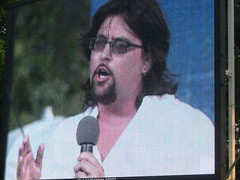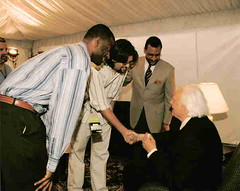Pentecostal Clergy on the Absence of Black Fathers

"Father absence is the bane of the black community, predisposing its children (boys especially, but increasingly girls as well) to school failure, criminal behavior and economic hardship -- and to an intergenerational repetition of the grim cycle. The culprit, the ministers (led by Boston's Rev. Eugene Rivers III, president of the Seymour Institute) agreed, is the decline of marriage. ... [B]lack men aren't born incarcerated, crime-prone dropouts. What principally renders them vulnerable to such a plight is the absence of fathers and their stabilizing influence." Full article by William Rasperry.Gene Rivers in executive director of the Ella J. Baker House in Dorchester. One case study describes him this way:
A self-described "New Leftist" who converted a former crack house in one of Boston's poorest communities into the headquarters of his now-celebrated activist ministry, Rivers is among the founders of the Ten-Point Coalition, a group of churches that came together in 1992 to combat the gang violence that was claiming the lives of a growing number of the city's black and Latino youths. Less than a decade later, Boston's homicide rate has plummeted 80 percent, turning Rivers's faith-centered, street-level ministering into the stuff of legend. "Savior of the Streets," proclaimed a 1998 Newsweek cover story on "God vs. Gangs" that hailed Rivers's Christian style of social outreach as "the hottest idea in crime fighting." The Ten-Point Coalition has been the subject of a PBS documentary, a glowing Joe Klein article in The New Yorker, and stories in publications ranging from The Weekly Standard to Time.
I visited Rev. Rivers at the Baker House in 1998. My impression at the time: a great man and impassioned advocate with a big heart, sharp mind, and quick wit. A hero to many. Apparently, he's still the same.













0 Comments:
Post a Comment
<< Home